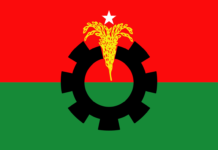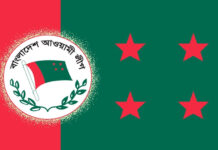AFTER years of stalemate, the two competing political camps engaged in rancorous dispute over rules of transition of state power in Bangladesh, due within three months under the 15th Amendment of the Constitution adopted “unilaterally” on the strength of brute majority of the Treasury Bench in the parliament (within six months under the caretaker system of transitional government as was pre-existing and is preferred by the boycotting Opposition in the parliament), have been persuaded to make ritual motions for talks to settle the dispute. The Prime Minister on October 18 offered to talk with the Leader of the Opposition over formation of a skeleton all-party cabinet under her leadership to oversee the transitional administration during hustings and general election, to be held strictly within the framework of the 15th Amendment of the Constitution.
She followed up the motion with the promulgation by her police and her home ministry of a ban in the capital city on all outdoor and indoor meetings, gatherings and demonstrations for an indefinite period starting October 20. The Leader of the Opposition, who was scheduled to address an indoor grand assembly of combined professionals (doctors, engineers, educationists, journalists, agronomists) of her camp that day, reacted sharply and declared that she would defy the ban, calling upon local and foreign journalists to witness her defiance of the violation of basic right of assembly of citizens and repression of opposition activists by the incumbent “wayward” party in power.
Ban relaxed
In the event, the ban was relaxed for the scheduled indoor “convention” of professionals, which the Leader of the Opposition Khaleda Zia addressed with a declaration that fair election cannot be held under Prime Minister Sheikh Hasina and her opposition alliance would not take part in any election under the present prime minister. She threw a challenge to the prime minister as follows: “If you think you’ll hold the polls with the support of the police, RAB and BGB, it’ll be wrong…it won’t be allowed in this country.
“You have made a lot of commitments to people but you did nothing for them. The people of the country didn’t give you the mandate to drop the caretaker government provision from the Constitution. You could have gone for a referendum in this regard. You didn’t as you didn’t have the courage.
“If you think you’re still popular or your party has the popularity let’s have a level playing field. People will give their verdict.”
On October 21, the Leader of the Opposition held a press conference outlining her own counter-proposal for the transitional government to oversee free and fair polls. She sought consensus with the ruling party over formation of a non-partisan interim government, for which “the Awami League select five persons and the BNP five, from among the 20 advisors who served in the two caretaker governments of 1996 and 2001,” as they have the recognised track record of neutrality in polls. The Awami League won the election under one and the BNP under the other. A respectable person, “acceptable to all”, could head that neutral government for the hustings and poll period.
Ruling party leaders, including the prime minister, were “not at all excited” about the opposition leader’s counter proposal. They rejected it outright as “unconstitutional”, but reserved their official response to the proposal. Representatives of foreign powers in Bangladesh, i.e. the diplomatic community in Dhaka, and also the Assistant Secretary General of the United Nations were excited, however, that on the basis of the two proposals, though patently irreconcilable, “the government and opposition parties in Bangladesh could proceed for a constructive dialogue.
Ritual of a Dialogue
UN Assistant Secretary General for Political Affairs Oscar Fernandez-Taranco welcomed BNP Chairperson Khaleda Zia’s proposal on polls-time government. US Ambassador to Bangladesh Dan Mozena said with the prime minister’s speech on October 18 and the opposition leader’s press event on October 21, the door for dialogue had opened. William Hanna, ambassador of the EU delegation to Bangladesh, said: “It is good to see both parties seeking to avoid the path of confrontation…. I really do think this is the time now to engage in dialogue and positive signals have been given.” Australian High Commissioner in Dhaka Greg Wilcock in a statement welcomed the recent remarks by the prime minister and the leader of the opposition proposing solutions to Bangladesh’s political challenges: “We encourage all sides to seize this opportunity for peaceful, constructive dialogue on a way forward.”
US Ambassador Dan Mozena visited India High Commissioner Pankaj Saran at his residence on October 22, and discussed Bangladesh’s present political challenges and the dialogue process that has begun between the two major political parties. Reportedly, a senior official of one of the embassies said the prevailing political stalemate and the holding of election were discussed elaborately. Mozena and Pankaj hoped for a political dialogue between the two major parties to resolve the issues of election-time government and of free, fair, transparent, credible and inclusive polls.
Thus diplomats representing the international community as well as the national media are clapping and cheering the ritual of a dialogue process for resolution of political stalemate in Bangladesh. That process has practically come to nought already and the general public had already perceived the process as a make-believe charade. The (acting) BNP secretary general’s emissaries delivered a letter requesting talks on BNP proposals to the Awami League General Secretary, who made a courtesy phone call back to his BNP counterpart, but reserved Awami League response to the letter. The parliamentary opposition party attended the supposedly last session of the current parliament, now extended to November 7 from previously declared date of prorogation on October 24, only to walk out when the opposition parliamentarians’ requests for discussion on their proposal of a neutral interim administration for the general election period was rejected as irrelevant and unconstitutional by the Treasury Bench and abuses were hurled at late President Ziaur Rahman, founder of BNP.
Police ride roughshod
Late in the night of October 21, a former president of the student wing of BNP, Sultan Salahuddin Tuku was detained from BNP Chairperson Khaleda Zia’s convoy during a scuffle between police and her personal security staff. Khaleda was leaving her party headquarters after visiting the sick bed of BNP Joint Secretary General Ruhul Kabir Rizvi, who was residing in the office. It took police five minutes to make passage for the convoy. Soon after the vehicles started to roll, law enforcers stopped a microbus of the BNP Chairperson’s Security Force (CSF) that maintains the BNP chief’s security. Police claimed the microbus had hit some police officials.
CSF members including its chief official Col (retd) Mujib got locked in a tussle with the law enforcers. The cops assaulted a CSF officer named Enam. When a policeman told his senior officer that someone else was inside the vehicle, police smashed a glass of the microbus and pulled out Tuku. The additional deputy commissioner of police (Motijheel division), present charged that the microbus carrying Tuku and others had knocked and injured him. The special secretary of the BNP chairperson present during the scuffle kept his cool and let the police have their way, which according to some analysts might have prevented a possible “crossfire” over the alleged obstruction and “injury” to police on duty.
In fact, the ban on indoor and outdoor assembly of any kind, which in effect is promulgation of a form of civil emergency, has not only been not withdrawn in the capital, but extended to two other cities, namely Barisal and Chittagong. The government has formed a special task force comprising of police and BGB personnel to combat possible violence in seven divisional headquarters. They have been equipped with armoured personnel carrier for heightened mobility and riot-preparedness. Yet in the capital itself, the ban is being defied by lightening demonstrations where the police is not around, and ruling party offices are coming under attack and arson. A general strike was observed in Tangail, Tuku’s home district, immobilising inter-district traffic between the capital and the northern parts of the country. In Bogra, section 144 has been imposed after an attack on the main police station. The Opposition alliance has declared that it will defy government ban and hold public meetings as scheduled and notified long back in Dhaka, Chittagong, Barisal and all other district towns and upozilla headquarters throughout the country. One wonders whether the government may respond by elevating the partial civil emergency by calling in the military in aid of civil administration.
Source: Weekly Holiday










